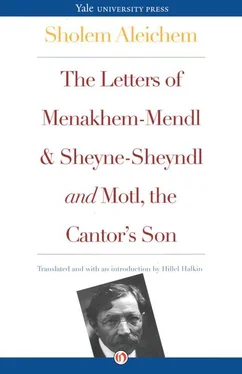Beginning with the writing of its first chapters, Sholem Aleichem intended Motl, the Cantor’s Son to be a saga of Russian-Jewish emigration to America in which Motl’s story would be continued through adolescence and into adulthood. His initial plan was for his hero to be a successful musician taking after his father, and the opening of Part I abounds in references to Motl’s musical talents. On his return trip from New York to Europe in 1907, however, Sholem Aleichem met aboard ship a young man, the son of Jewish immigrants to America, who was traveling to Europe to study art, and, much taken by him, converted Motl into a budding artist — a motif introduced for the first time in Chapter 17 of Part I, in which Motl tells us, “I’ve liked to draw since I was little.” As Dan Miron perceptively points out, the reason for this change was probably the author’s realization that, on a symbolic level, the character of Motl worked better if he did not follow in his father’s footsteps but rather struck out on his own in a creative field that, unlike music, was not traditionally Jewish. [18] Miron, “Bouncing Back,” p. 170.
It is entertaining to speculate what would have become of Motl had his creator lived to keep writing about him. A well-known painter? A syndicated cartoonist? Perhaps even an animated filmmaker in Hollywood? Any of these would have been in keeping with Sholem Aleichem’s expansive sense of the prospects America held for its Jews, the historical acumen of which seems even greater in light of his own failure to do well there. ( Motl itself was discontinued in 1908 because the editor of Der Amerikaner thought it boring!)
As for Pinye, who knows? “Prehzident,” which in his ignorance of constitutional law he believes himself eligible for, he will never be, nor as rich as his triumvirate of heroes, “Kahnegi,” “Rahknfelleh,” and “Vendehbilt.” But why not (if not a writer of lyrics for songs and Broadway musicals) president of his own large ad agency? He is still young, in his late teens or early twenties (Kasrilevke marriages take place at an early age — Elye’s when he has barely begun to grow a beard), and with his drive and a few years of night school, there is no reason why Pinye cannot go far.
Elye should do well as a small-time businessman. Despite his comic entrepreneurial adventures in Kasrilevke, he is too hesitant and brooding to take larger risks and has Brokheh at his side to see that he doesn’t. A nice “foinitsheh” store — after all, he already knows the business — seems a good bet, unless he ends up going into his father-in-law’s knish business.
Elye and even Pinye will always remain immigrants; they are too old to learn to speak English without an accent and this alone will mark them as first-generation Americans. Not Motl, however, who in a year or two will be indistinguishable from native-born New Yorkers his age. Already he is shooting marbles in the street; before long it will be stickball, handball, and off-the-stoop. He will become a Yankee, Dodger, or Giant fan; will finish P.S. 75 or 147 and go to Seward or Stuyvesant High; will spend long summer days at Coney Island. If he was nine in 1907, he may be sent to fight in World War I. He will be a young man during Prohibition; he will still be young when the Depression comes along. Too old to serve in World War II, he will be in his mid-fifties when he hears his first rock ’n’ roll and in his mid-sixties when John F. Kennedy is shot.
It is a bit of a shock to think of him this way. It is a shock to realize that his memories of Kasrilevke will become few and fuzzy; that although he will not forget his Yiddish, he will rarely or never speak it once his mother dies. In fact, had Sholem Aleichem lived to continue Motl’s story, he would have been confronted by a dilemma, because Motl will soon stop thinking in Yiddish. Would it have been feasible, from a literary point of view, to have him continue narrating in it? What psychological sense would this have made?
The rapid encroachment of English on Yiddish is a central theme in Part II of Motl . Put to comic effect there, it is nevertheless a reliable gauge of the speed with which Americanization is taking place. By contrast, one of the salient things about the book’s second half is how small a role Jewish tradition plays in it. Even in Part I, tradition fades increasingly into the background after Peysi the cantor’s death; although Motl grudgingly goes to synagogue to say the mourner’s prayer, it is not clear how long he keeps this up, and once the family is on the road, the only religious rituals we hear of are a single accidental prayer quorum in London and the Yom Kippur service aboard the Prince Albert . Yet in America there is not even that much. Though Elye, it would seem, still observes the basics of Judaism and says his morning prayers before going to work, only his mother attends synagogue services, and the cuffs Elye gives Motl for smoking on the Sabbath — an act strictly prohibited by Jewish law — are less noteworthy than Motl’s reaction to them. “It seems that if Peysi the cantor’s son is caught smawkink on the Sabbath, you’re allowed to beat him to death,” Motl declares, not with defiance or guilt ( that we last see aboard the Prince Albert, when he hopes God doesn’t know he is dreaming of food on Yom Kippur), but with the precocious amusement of one who no longer understands how such things could matter to anyone. If Motl — who once told us in Kasrilevke, in one of his few expressions of visceral Jewishness, of his hatred for pigs — has not already eaten his first New York ham sandwich, can we doubt that this is only a matter of time?
Will he one day marry out of his people — something that, to his family and even to himself, is still unimaginable in 1907? Perhaps not, since the years when he is most likely to marry will be ones of low intermarriage rates for American Jews. If he does raise Jewish children, however, this will be strictly sociologically determined. Internally, there is nothing we can detect in him — no inelasticity of self, no allegiance to his father’s memory — to keep him within the Jewish fold.
This is why Motl, the Cantor’s Son is not so cloudlessly sunny a work after all — or rather, why its sunshine is that of the summer that ends three times in the book: with the departure from Kasrilevke, with the embarkation from London, and with the final breaking off of the narrative. Though his two stays in New York barely added up to two years, Sholem Aleichem was quick to intuit the full enormity of the transformation that Jews in America were about to undergo. He was not oblivious to the sweatshops, the tenements, or the eastern European atmosphere of neighborhoods like the Jewish Lower East Side; these things are featured in Motl, too. But more than most Jewish writers and intellectuals of his time, with their view of America’s immigrant Jewish community as either another chapter in the repetitive cycle of Jewish history or part of a worldwide struggle against an oppressive capitalist order, he understood that America was something radically new: a truly gebentsht land for its Jews, who in return for its blessings would gladly relinquish the rich ethnic particularity that all his writing was about.
Motl is the happy ending of the eastern European Jewish tragedy, the rise after which there is no longer any fall. But he is also the end of Sholem Aleichem’s world, his face lifted to the kiss that will kill it benignly at the same time that it is being murdered brutally in Europe. Even had Sholem Aleichem kept writing about him, Motl would have outstripped his creator, venturing into realms that Sholem Aleichem did not know and could not have followed him in without holding him back. Sholem Aleichem died before he could lose him, just as Peysi the cantor did.
Читать дальше












